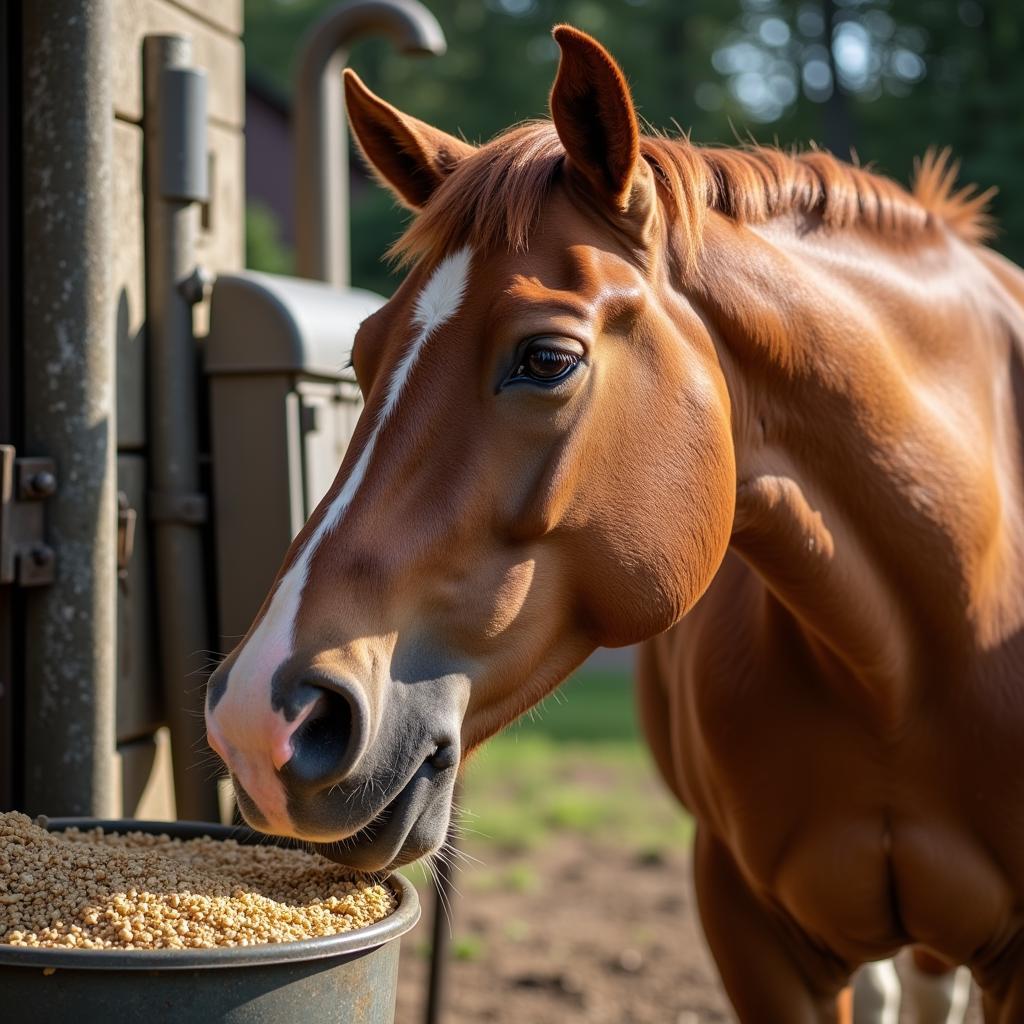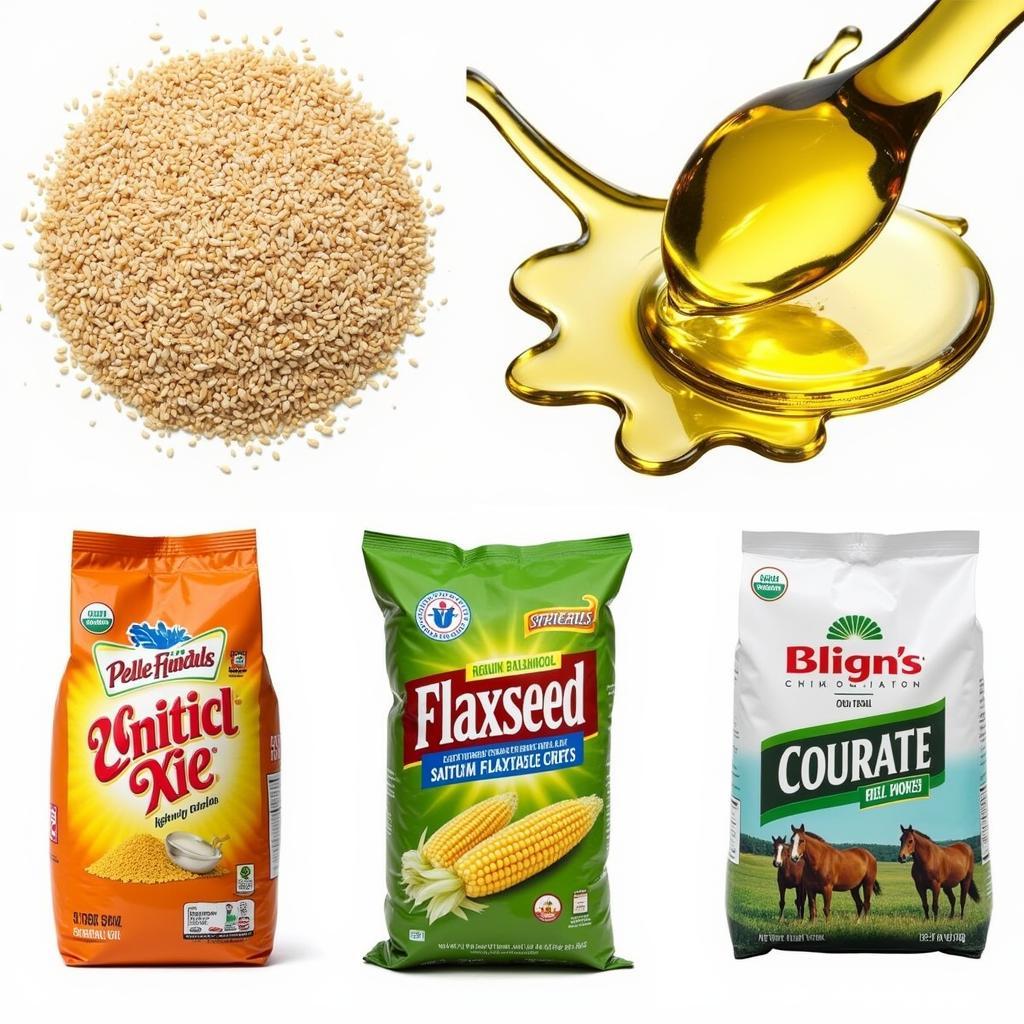High Fat Horse Feed is becoming increasingly popular among horse owners, and for good reason. Adding fat to your horse’s diet can provide a range of benefits, from improved energy levels to a shinier coat. But when is a high fat horse feed the right choice for your equine companion? This comprehensive guide delves into the intricacies of high fat horse feeds, equipping you with the knowledge to make informed decisions about your horse’s nutritional needs.
Why Fat Matters in a Horse’s Diet
Horses utilize energy derived from various sources, with fat being a highly concentrated option. Compared to carbohydrates, fat offers twice the energy density, making it an excellent fuel source for horses with high energy demands. This is especially beneficial for performance horses participating in disciplines like racing, eventing, and endurance riding.
Beyond boosting energy, fat plays a crucial role in numerous bodily functions. It aids in the absorption of fat-soluble vitamins (A, D, E, and K), essential for maintaining overall health and well-being. Moreover, fat contributes to healthy skin and a glossy coat, a testament to your horse’s overall condition.
When to Consider High Fat Horse Feed
While fat is a valuable component of any horse’s diet, certain situations warrant an increase in fat intake.
Performance Horses:
Horses engaged in strenuous activities require readily available energy sources to support their demanding workloads. High fat horse feeds provide this sustained energy release, delaying fatigue and optimizing performance.
Hard Keepers:
Some horses struggle to maintain weight due to various factors, including high metabolism or dental issues that hinder efficient food utilization. High fat feeds offer a calorie-dense solution, helping these “hard keepers” achieve and maintain a healthy weight.
 Horse Consuming High Fat Feed
Horse Consuming High Fat Feed
Senior Horses:
As horses age, their ability to digest and absorb nutrients can decline. High fat feeds offer a more easily digestible energy source compared to fiber-heavy diets, ensuring senior horses receive adequate calories and maintain their weight.
Horses with Specific Medical Conditions:
Certain medical conditions, such as muscle disorders or insulin resistance, might benefit from a high fat diet. It’s crucial to consult with your veterinarian to determine if a high fat feed is appropriate for your horse’s specific health needs.
Types of High Fat Horse Feeds
The market offers a variety of high fat horse feed options, each formulated with different fat sources and nutrient profiles. Some common types include:
- Rice Bran: A byproduct of rice milling, rice bran is a palatable and cost-effective source of fat.
- Vegetable Oils: Oils like corn oil, soybean oil, and flaxseed oil can be added to feed to increase fat content.
- Flaxseed: Rich in omega-3 fatty acids, flaxseed can be beneficial for horses with inflammatory conditions.
- Commercial High Fat Feeds: Many reputable feed companies offer pre-formulated high fat feeds, providing a balanced blend of nutrients along with increased fat content.
 Various High Fat Horse Feed Options
Various High Fat Horse Feed Options
Choosing the Right High Fat Horse Feed
Selecting the appropriate high fat feed for your horse depends on several factors:
- Age and Breed: Different life stages and breeds have varying energy requirements.
- Activity Level: Horses engaged in strenuous activities need higher fat content compared to those with lower activity levels.
- Health Condition: Underlying health issues might influence the suitability of specific fat sources or require a specialized feed formulation.
Always consult with your veterinarian or an equine nutritionist to determine the ideal high fat feed for your horse’s unique needs. They can assess your horse’s individual requirements and recommend a feeding program that promotes optimal health and performance.
Introducing High Fat Horse Feed Gradually
When transitioning your horse to a high fat feed, a gradual approach is crucial to avoid digestive upset. Start by adding small amounts of the high fat feed to your horse’s existing diet, gradually increasing the proportion over several days or weeks. This allows your horse’s digestive system to adapt to the increased fat content, minimizing the risk of complications.
Conclusion
Incorporating high fat horse feed can provide numerous benefits for your equine companion, but it’s essential to make informed decisions based on your horse’s individual needs. By understanding the role of fat in a horse’s diet and carefully considering the available options, you can provide your horse with the nutritional support they need to thrive. Remember to consult with your veterinarian or equine nutritionist to determine the most appropriate high fat feed for your horse’s age, breed, activity level, and health status.
For further insights into equine nutrition, explore our other informative articles on horse hoof health problems, blue seal senior horse feed, and senior horse feed comparison.
FAQs
1. Can I feed my horse too much fat?
While fat is beneficial, excessive fat intake can lead to digestive upset and other health issues. It’s crucial to follow the feeding recommendations provided by the feed manufacturer and your veterinarian.
2. Are there any risks associated with high fat horse feeds?
High fat feeds are generally safe when fed appropriately. However, rapid introduction or excessive intake can cause digestive problems.
3. Can I feed high fat horse feed to my pregnant mare?
Pregnant and lactating mares have increased energy requirements. Consult with your veterinarian to determine the appropriate fat content in their diet.
4. What are the signs of fat deficiency in horses?
Signs of fat deficiency can include weight loss, dull coat, and poor performance.
5. Can I mix different types of high fat horse feeds?
It’s best to avoid mixing different high fat feeds unless advised by an equine nutritionist. Each feed is formulated with specific nutrient profiles, and mixing them can disrupt the balance.
Need further assistance regarding your horse’s nutritional needs? Don’t hesitate to contact us. You can reach us by phone at 0772127271, by email at [email protected], or visit us at our location in QGM2+WX2, Vị Trung, Vị Thuỷ, Hậu Giang, Việt Nam. Our dedicated customer care team is available 24/7 to assist you.
Explore our website for additional resources on synchill for horses and liquid joint supplements for horses. Your horse’s well-being is our priority.